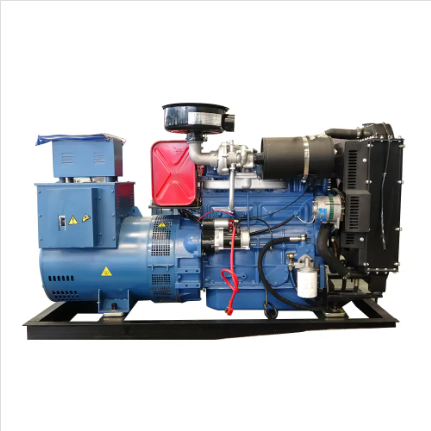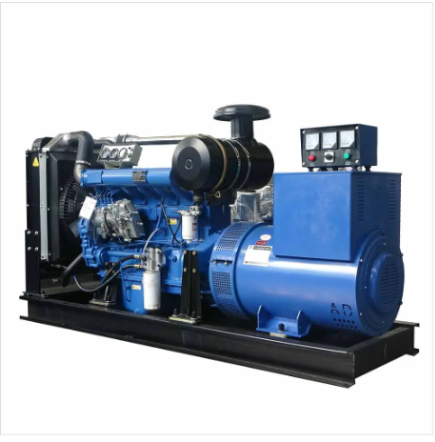Դիզելյան գեներատորներ՝ ឧստադական արդյունավետություն
Կառուցվածքային արդյունավետություն և երկար գործակալական ցիկլեր
Դիեզային էլեկտրոգեները հայտնի են իրենց վառենքի ավելի բարձր դասավորությամբ, քանի որ դրանք սովորաբար 25-40%-ով ավելի լավ վառենքի տարածություն ունեն, համեմատաբար նույն գազով աշխատող մոդելների հետ։ Սա կապված է ավտոմոբայլի դիեզի բարձր էներգիայի խտության հետ, որը նำն բարձր ջերմական դասավորության։ Մեծ տանկերը տարածում են երկար աշխատաժամեր comerցիալ և ինդուստրիալ կիրառումների համար։ Օրինակ, կառուցման ոլորտում, որտեղ այս էլեկտրոգեները օգտագործվում են վավեր էլեկտրոէներգիա տալու համար երկար ժամանակավարում։ Նույնպես, տվյալների կենտրոնները գնահատում են վառենքի ավելի բարձր դասավորությունը և վավերությունը, վերականգում իրենց էլեկտրոէներգիայի արտացոլումը դեպի էլեկտրոէներգիայի սխալում։ Այս կիրառումները դժվար են, որտեղ աշխատելու արդյունավետությունը և անընդհատությունը՝ առանց անընդհատ վառելու, կարևոր առավելագույն առավելությունն է։
Ստրեսային արտադրություն և արտադրության դիտարկումներ
երբ խոսքը դիտակի գեներատորների մասին է, աղմուկի մակարդակը, արտանետումները շատ կարևոր գործոններ են: Ընդհանրապես, այդ գեներատորները աղմուկ են արձակում 70 դԲ-ից մինչև 100 դԲ՝ կախված տիպից և հզորությունից: EPA-ն (Շրջակա միջավայրի պաշտպանության գործակալություն) սահմանել է արտանետումների նորմեր՝ միջավայրի վրա բացասական ազդեցությունը նվազեցնելու համար, և այժմ մեծամասնությունը համապատասխանում է կամ գերազանցում է այդ չափանիշները: Տեխնոլոգիական բեկումներ են տեղի ունեցել, որոնք առաջացրել են ավելի քիչ աղմկոտ տիպեր՝ ներկայացնելով ձայնի նվազեցման հնարավորություններ, ինչպիսիք են ձայնամեկուսացված կոնտեյներները և բարելավված արտանետման համակարգերը: Այս զարգացումները նաև նվազեցնում են ձայնային աղտոտումը և օգնում են համապատասխանել շրջակա միջավայրի կանոնակարգերին՝ դիտակի գեներատորներին ավելի հարմար դարձնելով բնակելի շրջաններում և բնակարանային տներում օգտագործելու համար:
Ծախսային պահանջներ անգամ օգտագործման դեպքում
Ձեր դիզելային գեներատորները սպասարկված պահելը, հատկապես լրիվ օգտագործման դեպքում, կարևոր քայլ է գեներատորների երկար կյանքն ապահովելու համար: Շատ լավ է կատարել կանոնավոր պահպանման աշխատանքներ, ինչպիսիք են յուղի փոխումը, ֆիլտրերի փոխարինումը և հնարավոր սառեցման համակարգի ստուգումը: Կանխարգելիչ պահպանումը կարևոր է, իսկ մեծ մասամբ պլանավորված պահպանումը հիմնված է մեքենայի աշխատանքի ժամերի վրա, ոչ թե շարժիչի տարիքի վրա: Օրինակ, «յուղի փոխում» ամեն 250-500 ժամ օգտագործման համար կարող է խորադրվել: Այդ կանոնավոր պահպանման աշխատանքները անտեսելը կնվազեցնի անվտանգության միջև ընկած ժամանակը և գեներատորի կյանքի տևողությունը, ինչը կհանգեցնի ավելի շատ գումարի ծախսմանը նորոգման կամ փոխարինման համար: Ինչպես նաև, ինչպես ցույց են տալիս արդյունաբերության վիճակագրությունները, հետաձգված պահպանումը կարող է հանգեցնել նորոգման հաշիվների մի շարք անգամ ավելի մեծ լինելուն, քան պլանավորված պահպանման վրա ծախսված գումարը, որը ընդգծում է այդ ծախսերի կարևորությունը:
Գազով աշխատող տարբերակներ. Էներգիայի աղբյուրների բազմակողմանիություն
Բենզինային գեներատորներ. տեղափոխելիության փոխզիջումներ
Դուրսագրվող և բազմակից, բենզինյան գեներատորները ունեն շատաթիվ կիրառություններ։ Քանի որ դրանք այնքան հեippleուն են և դուրսագրվող, դրանք ենթադրելիորեն լավ ընտրություն են ազգային և արագ էլեկտրական պահանջների համար, օրինակ՝ խաչմունքների ժամանակ։ Բայց այդպիսի գործոնները գնահատվում են գինով։ Եվ չնայած փոքրանիշ ավելի պակաս արդյունավետությամբ, փոքր կառուցվածքի բենզինյան գեներատորները ունեն կոտորակային աշխատաժամեր դիեզելյան մոդելներից և կարող են պահանջել անընդհատ արտադրություն երկար ժամանակահատվածների համար։ Այս համատեղափոխությունը հասկացելու հնարավորությունը կարող է դիտել առավելությունների և արդյունավետության միջև։ Բենզինյան գեներատորները շարունակում են ունենալ մեծ շուրջընթացական մասանցին արագացող և հետադարձ էլեկտրական սեկտորներում՝ հիմնավորված վերջին տվյալներով, չсмотря на, և կարելի է պատճառով, որոշ սահմանափակումներ։ Այս հարմարությունն ու մոբիլությունը դեռևս դրանց պահում են պահանջվող կիրառություններում, որտեղ մոբիլությունը ավելի կարևոր է, քան աշխատաժամերը։
Պրոպան/Բնական գազ՝ կարևորագույն անալիզ կարակտերիստիկաներ
Պրոպանի և բնական գազի գեներատորները դառնալիս են ավելի հաճախորդներ, քանի որ դրանց դիեզելից համեմատյալ փոքր է հաղորդագրությունը։ Եթե ասենք գեներատորների մասին, ապա այս գազադարձող տարբերակը ունի շատ փոքր углерդային հետք, որը վավեր կարող է լինել այն գործընկերությունների և անձանց համար, ովքեր շատ են գործում միջավայրի վերաբերյալ։ Սա մի միջավայրային առավելություն է, որը նำում է մեծ տendency-ին բնական գազի գեներատորների վերաբերյալ, ինչպես նաև այն արժեքների մեջ, որոնք արժանացնում են կանաչ տեխնոլոգիաները։ Դժվար է համաձայնվել այն մարդկանց հետ, որոնք ունեն շատ փոքր թարմացող և վատ քիմիական տարրեր՝ շատ քիչ դեռևոր։ Կա որոշ հասարակ պագունկ այն մարդկանց մեջ, որոնք փոխեցին կոլալից բնական գազին՝ էլեկտրական արտադրության համար։ Բնական գազի հաղորդագրությունները շատ փոքր են կոլայից, և սա միայն արտացոլեցրեց գործընկերություններին տեղափոխվելու բնական գազին, եթե նրանք ցանկանում են համաձայնվել միջավայրային և կանոնականության պահանջներին, ինչպես նաև պահել արժեքները սահմանափակումների ներսում։
Ինֆրաստրուկտուրայի պետքերը անընդհատ գործառույթի համար
Պրոպանի և բնական գազի տուրբինային միավորները ադամանտացող են այն չափով, որքան հասատիչների թանկային արկերը և ներդրումները պահում են հասանելիությունը հասատիչին: Այս ինֆրաստրուկտուրայի ներդրումը նաև ներառում է սկզբնական կառավարման ծախսերը, որոնք անհրաժեշտ են ընկերությունների համար և ազդում են իրենց որոշման գործընթացին: Ենկերությունները ավելի շատ սեktorներում սեղմում են այս համակարգերը՝ ինչպես որ առողջապահության, մարդատարության և այլ սեկտորներում, որոնք չեն կարող թույլ տվել էլեկտրական հասանելիության խախտում: «Դեպքերի պատմությունները ցույց են տալիս, որ այս ներդրումները կարող են արդյոք արդյունքային հաջողություններ բերել ադամանտացման և վստահելիության մասին:» Սկզբնական ծախսերը կարող են լինել թանկ, բայց երկարաժամկետական խաղադարձները՝ ցածր ելակումներով և օպտիմալ ադամանտացմամբ, դարձնում են այս գեներատորային համակարգերը հայտնի լուծում համար անդամական էներգիային կենտրոններին:
Էլեկտրական/Սոլար Գեներատորներ՝ Հասարակական Բարականություններ
Բատարեյային ACITY Համեմատությունը ու Էլեկտրական Դուրսագրումը
Դաշտի չափով համապատասխանեցնել ակւմուլյատորի ուժը պահանջվող ուժին է անհրաժեշտ գործակից սոլար ուժի լուծում ձևավորելու համար։ Ամբողջական ակւմուլյատորի չափերը 5-15 kWh են համարվում տնտեսության վերջին օգտագործողների համար, սակայն առարկայական օգտագործման համար նախկին կարգավորումներ են կատարվել մեծ քան 100 kWh-ի բեռն դուրս բերելու համար՝ բավարարելու համար մեծ բեռն պահանջներին։ Համապատասխան չափով օգտագործվող ակւմուլյատորների օգտագործումը հնարավորություն է տալիս համոզվել էներգիայի վավերության մասին և ստանալ նշանակալի հանգուլի կրճատում օգտագործողին էներգիայի օգտագործման օպտիմիզացիայի միջոցով։ Երբ ակւմուլյատորից բավական ուժ չկա, օգտագործողները կարող են դիմել իրենց էներգիայի համար խախտումներին, և ավելի շատ կկախվեն ցանցից ուժից, այնպես որ ստորարկելու են սոլար գեներատորի ունեցած միրավոր գործունեությունները։
Ստեղծ գործունեություն և զրո արտադրություն
Էլեկտրական և արեւային գեներատորները շատ համարված են, քանի որ դրանք գործնականում անձայն են և առաջացնում են փոքրագույն արտանետումներ, ինչը պատշաճ է բնակելի և ձայնային զգայուն վայրերի համար: Ուսումնասիրությունները ցույց են տվել, որ անցումը էլեկտրական կամ արեւային լուծումներին կարող է կտրուկ նվազեցնել ձայնային աղտոտման և արտանետումների ծավալը: Օրինակ, Շրջակա միջավայրի պաշտպանության գործակալությունը նշել է, որ մեկ տնային տնտեսում ավանդական էներգիայի աղբյուրներից արեւայինին անցնելով կարող է տարեկան խնայել մինչև 5000 ֆունտ ածխաթթու գազ: Կանոնակարգերը, ինչպես օրինակ՝ հարկային վճարների կրեդիտային հնարավորությունները և հետադարձ վճարումները, մոմենտ են ստեղծում անցման համար այս կանաչ էներգետիկ տարբերակներին:
Տեղացավորման անկախության սահմանափակումներ
Այնուհետև, ցանկացած չէ արդյոք արևի գեներատորների համար, որոնք կարող են հասնել ցանցի անկախության, բայց այսինքն որոշ バリեր ունի, գլխավորում առանց ապահովագրանցման և կախված լինելու անձրևից։ Հավաքական կամ արդյոք անձրևային պայմաններում PV անսանդղակները ոչ շատ արտադրում են, ինչ պատճառով նույնիսկ լավ ապահովագրանցման համակարգը կարող է դժվարվել։ Կարող են տալ պատասխան ապահովագրանցման տեխնոլոգիայի զարգացումներ, օրինակ՝ հիբրիդ համակարգեր, որոնք կարող են միացնել արևի էներգիայի արտադրությունը այլ աղբյուրների հետ, ինչպիսին են 바անդի կամ ջրային արտադրությունը։ Ամերիկայի Էներգիայի وزارةից և այլ kansահանրային էներգիայի ավաuthoritiesներից կազմված կազմակերպությունները կվերցնեն հետազոտությունները և կտեղափոխեն նամակները՝ արդյոք ցանցի անկախությունը դիտարկելով որպես հաջորդ գեներացիայի համար համարվող հասարակագործական էներգիայի լուծումների մեկ ասpektկը։
Կրիտիկական Համեմատական Գործիքներ Էներգիայի Լուծումների համար
Սկիզբնավորումը՝ Երկարաժամանակային 프로그րամավորման գնահատում
Գեներատորի արդյունավետությունը պատրաստության ժամանակ հեռացնող սխալի դեպքում շատ կարևոր է, քանի որ ցույց է տալիս, թե որքան ժամանակ կպահանջվի էլեկտրական էներգիայի վերականգնումն արագ դարձնելու համար: Սա կարող է համոզել, որ դիեզելյան գեներատորները սկսում են շատ արագ, սովորաբար միայն 10 վայրկյան անհրաժեշտ է հավասարակշռված փոխանցման համար՝ ապահովելով բավական էներգիան ժամանակին: Այն դեպքում, գազոլինային գեներատորները կարող են վերցնել մի փոքր ավելի ժամանակ՝ 10-20 վայրկյան: Սոլար գեներատորների միակ խնդիրը՝ չնայած դրանց բարդությանը կանաչ էներգիայի համար, նրանք կախված են ակումուլյատորի արտաքին արտաpositorից, որը չի կարող միշտ լինել օգտագործելի ձեր կարիքներին: Արագ սկիզբը շատ կարևոր է հաստատուն կամ կայուն հիմնարարների համար: Երկարաժամանակ գնահատումը ցույց է տալիս, որ դիեզելյան էլեկտրագեներատորները ավելի լավ են այդ դեպքերում: Օրինակ, 2022 թվականին Չիկագոյի հաստատունում դիեզելյան գեներատորների արագ պատրաստությունը դեր խաղացրեց բավական էներգիայի համար բժշկական ապահովումը՝ ցույց տալիս, թե ինչպես դրանք կարող են համարվել հեռացնող սխալի դեպքում:
Ընդհանուր արժեքի կոստի վերլուծություն
Գնահատական դրամացույց վերցնելիս գեներատոր, առաջին պատճառը դիտարկել գնահատման կյանքի արժեքն է, որը ներառում է և գնահատման գինը և այն կապված ապահովման և կայրի արժեքները: Դիեզելային գեներատորները, չնչատ թողնելու դեպքում գնահատությունը բարձրացնում է կայրի սպառողությունը և ապահովման արժեքները՝ ավելացնելով ընդհանուր գնահատման արժեքը: Օրինակ, եթե դիեզելային գեներատորը կարող է արժեցնել $5,000 գնահատման համար և կարող է արժեցնել $2,000/տարի կայրի համար և $500/տարի ապահովման համար: Կյանքի ընթացքում 10 տարիներում ընդհանուր արժեքը կլինի շարունակությամբ $30,000: Եվ հակառակը, արևական գեներատորները կարող են գնահատվել ավելի բարձր սկզբնական գներով՝ օրինակ՝ $10,000-ից, և ապա կարող են գնահատվել շատ փոքր գործառույթներով՝ արդյունքում՝ 5 տարվա ընդհանուր արժեքը կլինի մոտեցումը $15,000: Հատուկ գործուների հաշվետվությունները ցույց են տալիս, որ այս արևական դասավորությունների կյանքից առաջ անցնող արժեքների նվազումը պատճառված է հարթակային արդյունքներով և տեխնոլոգիական էվոլյուցիայով:
Կրացանյութի մատչելիության եւ պահեստավորման գործոններ
Գործիքների արտադրության համար վառելիքի մատչելիությունը եւ օգտագործումը եւ վառելիքի պահեստավորումը կարեւոր գործոն են արտադրողների արդյունավետության եւ մատչելիության համար: Դիզելային եւ բենզինային գեներատորները սակավության ժամանակ խնդիրներ են ունենում վառելիքի պահեստավորման եւ հուսալիության հետ կապված: ԱՄՆ էներգետիկայի տեղեկատվության վարչության տվյալներով՝ բենզինի գները տարբերվում են նավթի շուկայում եղած պայմանների հիման վրա, եւ դա կարող է ազդել այն բանի վրա, թե որքանով է պատրաստ օգտագործման համար բենզինով աշխատող գեներատորը։ Մյուս կողմից, արեւային գեներատորների համար, որոնք էլեկտրաէներգիա են արտադրում անսահմանափակ արեւային ճառագայթներով, չկա նման խնդիր, եւ դա արեւային գեներատորների մեծ առավելություն է: Հիպրիդային համակարգերի եւ ավելի մեծ վառելիքի պաշարների նման մոտեցումներ մշակելով կարելի է նվազեցնել պակասի ազդեցությունը: Սակայն արդյունաբերության վիճակագրությունը"Եթե ավանդական վառելիքը խիստ կարգավորվում է պահեստավորման ընթացքում, ապա ավելի շատ պատճառ կա համապարփակ վառելիքի կառավարման ծրագրի համար:

Էլեկտրականության արտադրության տեխնոլոգիայի նոր միտումներ
Հիբրիդային համակարգեր, որոնք միավորում են վառելիքի բազմաթիվ աղբյուրներ
Սիստեմները, որոնք ունեն բազմաթիվ կառուցվածքների համատեղելիությունը՝ գերազանց համակարգի արդյունավետության և արդյունավետության համար, դառնում են ավելի և ավելի հաճախ օգտագործվող: Այս աղբյուրները կարող են միացվել تقليստ կառուցվածքների հետ՝ համարյա կամ անապատուման աղբյուրների հետ, որպեսզի առաջարկեն սպառողներին ավելի վստահելի և արժեքավոր աղբյուր էներգիայի։ Երկարատև օրինակ է միացված դիեզել և արյա էներգիայի օգտագործումը հեռավոր տարածքներում՝ միասին մniejs կառուցվածքի օգտագործումը և դարձնելով ավելի փոքր։ Գլոբալ դիրքը ավելի շատ դիրք է դարձնում անապատուման էներգիայի և կարողանալության վրա, ուստի ունենում ենք ուժեղ ապացուցումներ շուկայի տեսանյութերից՝ համարյա արդյունավետության համար համատեղելիության համար, որը շուկան գնահատում է համատեղելիության ուղղությամբ՝ ավելի տրանսպարան և ավելի կարողանալությամբ համակարգի գործունեություն:
Երկարական МОնիտորինգ և Պրեդիկտիվ Պահում
Այս ժամանակները շատ հետաքրքիր են, քանի որ գեներատորային խումբերի վիճակի իրական ժամանակի համարձակումը հիմա դառնացել է հնարավոր՝ ինտելեկտուալ համարձակման տեխնոլոգիայի զարգացման պատճառով ունենալու մեջ էլեկտրական գեներատորների մեջ: Այս տեխնոլոգիաները, որպես նաև IoT-ի կիրառությունները, օգնում են համոզել, որ պահումը կատարվում է ավելի ճշգրիտ ձևով և կատարվում է այն ժամանակ, երբ այն անհրաժեշտ է, այսպիսով երկարացնելով գեներատորային համակարգերի կյանքը և ավելացնելով դրանց արդյունավետությունը: Օրինակ, պատահարային պահումը հայտնի է որպես դատարկ ժամանակի և գործական արժեքների շարունակ նվազումը: Վերջին զարգացումները տվյալների կենտրոնների և բժշկական ոլորտների մեջ ցույց են տալիս, որ համակարգերի վավերության և արդյունավետության ավելացումը դառնում է հնարավոր այս տեխնոլոգիական զարգացումների պատճառով: Ավելին, տեխնոլոգիական մասնագետները ցույց են տալիս IoT-ի կարևոր ազդեցությունը գեներատորային ոլորտի մեջ պահումի և գործառույթի վերաբերյալ:
Բիոկայրերի համատարածության զարգացումներ
Ավանդական գեներատորները շատ առաջընթաց են գրանցել կենսաբուսական վառելիքի նկատմամբ բարեկամ դառնալու հարցում, եւ դա դրական ազդեցություն ունի շրջակա միջավայրի վրա: Բիոէներգիաները ավանդական հանքային վառելիքների փոխարեն այլընտրանք են, որոնք ապահովում են արտանետումների նվազում եւ էներգիայի բազմազանության բարձրացում: Տվյալները ցույց են տալիս, որ համատեղելիության աճը ավելի ու ավելի մեծ է բիոտառելիքի արտադրության աճի շնորհիվ, քանի որ ավելի ու ավելի շատ արդյունաբերություններ եւ կարգավորող մարմիններ նախընտրում են այս մաքուր այլընտրանքը: Ազգային եւ միջազգային կանոնակարգերը շրջվում են կենսաբուսական վառելիքի ուղղությամբ, եւ որոշ ազգային ծրագրեր թելադրում են կենսաբուսական վառելիքի խառնուրդների օգտագործումը: Այս դրությունը մեծանում է կենսաբուսարավազաների ապրանքայինացման աճող միտումով, որը համապատասխանում է գլոբալ կայունության նպատակներին եւ առաջարկում է կենսունակ էներգետիկ այլընտրանք:
Frequently Asked Questions - Հաճ📐
Դիեզելյան գեներատորների ո՞ր առավելություններ են ունենում գազային համարժեքներից։
Դիեզային գեներատորները գազային գեներատորներից հավատելի են կառուցվածքով և ունեն ավելի երկար գործադրական ցիկլեր։ Նրանք ստորագրված են անընդհատ էլեկտրական ուժ պահանջող բնագավառներին, ինչպիսիք են շինարարությունը և տվյալների կենտրոնները, քանի որ կարող են անընդհատ գործել առանց հաճախական արձակումների։
Ինչպես են համեմատվում դիեզային գեներատորների արտադրանքները այլ տիպերին համեմատ?
Եթե դիեզային գեներատորները առաջին կերպով ավելի շատ ձայն և կատարող փոխարկություններ են արտադրում, տեխնոլոգիական առաջադրանքները նำն են բերել հավատալի մոդելներին, որոնք համապատասխանում են EPA ստանդարտներին։ Կամավորների նման համարակալված/բնական գազային գեներատորները առաջարկում են ավելի կLEAN կատարող փոխարկություններ, բայց կարող են պահանջել լրացուցիչ ինֆրաստրուկտուրային համակարգ։
Արդյո՞ք կարևոր է պահուսարանը դիեզային գեներատորների համար։
Այո, դիզելային գեներատորների համար կանոնավոր պահպանումը շատ կարեւոր է, հատկապես ծանր օգտագործման դեպքում: Նման ընթացակարգերը, ինչպիսիք են յուղի փոփոխությունը եւ ֆիլտրերի փոխարինումը, ապահովում են երկարատեւ եւ արդյունավետություն, կանխում են թանկ վերանորոգումները կամ համակարգի խափանումները:
Ինչպես են արտադրում սոլար գեներատորները համարյա էներգետիկ լուծում։
Սոլար գեներատորները բա hjուղություն չեն տալիս և աշխատում են հանգույցով, ինչպես որ դրանք համապատասխանում են կյանքապահունդական և ձայն-հավատալի միջավայրերին։ Դրանք համաձայնացված են կանոնական նպատակների հետ և կարող են նշանակալիորեն նվազեցնել կարբոնային հետքերը՝ համեմատելով تقليսի էներգիայի աղբյուրների հետ։
Ի՞նչ են հիբրիդ գեներատորային համակարգերի գործունեությունները։
Հիբրիդ համակարգերը, որոնք միացնում են բազմաթիվ կառուցվածքային աղբյուրներ, կարող են տարածել վստահելի և արժեքանշանով էներգիայի լուծումներ։ Դրանք օպտիմալացնում են աշխատանքը՝ օգտագործելով ամբողջական և վերականգնելի աղբյուրներ, նվազեցնելով կառուցվածքի ծախսերը և բա hjուղությունները։
Բովանդակության աղյուսակ
- Դիզելյան գեներատորներ՝ ឧստադական արդյունավետություն
- Գազով աշխատող տարբերակներ. Էներգիայի աղբյուրների բազմակողմանիություն
- Էլեկտրական/Սոլար Գեներատորներ՝ Հասարակական Բարականություններ
- Կրիտիկական Համեմատական Գործիքներ Էներգիայի Լուծումների համար
- Էլեկտրականության արտադրության տեխնոլոգիայի նոր միտումներ
- Frequently Asked Questions - Հաճ📐

